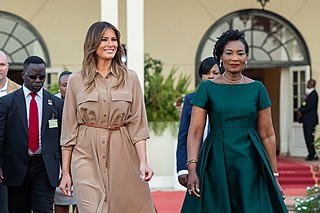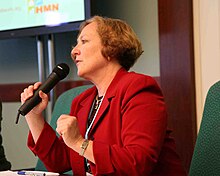
The World Health Organization (WHO) is a specialized agency of the United Nations responsible for international public health. It is headquartered in Geneva, Switzerland and has six regional offices and 150 field offices worldwide.

The Joint United Nations Programme on HIV and AIDS (UNAIDS) is the main advocate for accelerated, comprehensive and coordinated global action on the HIV/AIDS pandemic.

The United States President's Emergency Plan For AIDS Relief (PEPFAR) is a United States governmental initiative to address the global HIV/AIDS epidemic and help save the lives of those suffering from the disease. Launched by U.S. President George W. Bush in 2003, as of May 2020, PEPFAR has provided about $90 billion in cumulative funding for HIV/AIDS treatment, prevention, and research since its inception, making it the largest global health program focused on a single disease in history until the COVID-19 pandemic. PEPFAR is implemented by a combination of U.S. government agencies in over 50 countries and overseen by the Global AIDS Coordinator at the United States Department of State. As of 2023, PEPFAR has saved over 25 million lives, primarily in Sub-Saharan Africa.

The United Nations Office on Drugs and Crime is a United Nations office that was established in 1997 as the Office for Drug Control and Crime Prevention by combining the United Nations International Drug Control Program (UNDCP) and the Crime Prevention and Criminal Justice Division in the United Nations Office at Vienna, adopting the current name in 2002.

The International AIDS Vaccine Initiative (IAVI) is a global not-for-profit, public-private partnership working to accelerate the development of vaccines to prevent HIV infection and AIDS. IAVI researches and develops vaccine candidates, conducts policy analyses, serves as an advocate for the HIV prevention field and engages communities in the trial process and AIDS vaccine education. The organization takes a comprehensive approach to HIV and AIDS that supports existing HIV prevention and treatment programs while emphasizing the need for new AIDS prevention tools. It also works to ensure that future vaccines will be accessible to all who need them.

The Global Fund to Fight AIDS, Tuberculosis and Malaria is an international financing and partnership organization that aims to "attract, leverage and invest additional resources to end the epidemics of HIV/AIDS, tuberculosis and malaria to support attainment of the Sustainable Development Goals established by the United Nations". This multistakeholder international organization maintains its secretariat in Geneva, Switzerland. The organization began operations in January 2002. Microsoft founder Bill Gates was one of the first donors to provide seed money for the partnership. From January 2006 it has benefited from certain US Privileges, Exemptions, and Immunities under executive order 13395, which conferred International Organizations Immunities Act status on it.
The Deutsche Gesellschaft für Internationale Zusammenarbeit (GIZ) GmbH, often simply shortened to GIZ, is the main German development agency. It is headquartered in Bonn and Eschborn and provides services in the field of international development cooperation and international education work. The organization's self-declared goal is to deliver effective solutions that offer people better prospects and sustainably improve their living conditions.

The United States established diplomatic relations with Malawi in 1964 after Malawi gained independence from the United Kingdom. Malawi's transition from a one-party state to a multi-party democracy significantly strengthened the already cordial U.S. relationship with Malawi. Significant numbers of Malawians study in the United States. The United States has an active Peace Corps program, Centers for Disease Control and Prevention, Department of Health and Human Services, and an Agency for International Development (USAID) mission in Malawi. Both countries have a common history and English language, as they were part of the British Empire.
Population Action International (PAI) is an international, non-governmental organization that uses research and advocacy to improve global access to family planning and reproductive health care. Its mission is to "ensure that every person has the right and access to sexual and reproductive health, so that humanity and the natural environment can exist in balance with fewer people living in poverty". PAI's headquarters is in Washington, D.C.

Rwanda faces a generalized epidemic, with an HIV prevalence rate of 3.1 percent among adults ages 15 to 49. The prevalence rate has remained relatively stable, with an overall decline since the late 1990s, partly due to improved HIV surveillance methodology. In general, HIV prevalence is higher in urban areas than in rural areas, and women are at higher risk of HIV infection than men. Young women ages 15 to 24 are twice as likely to be infected with HIV as young men in the same age group. Populations at higher risk of HIV infection include people in prostitution and men attending clinics for sexually transmitted infections.
With less than 0.1 percent of the population estimated to be HIV-positive, Bangladesh is a low HIV-prevalence country.
Cases of HIV/AIDS in Peru are considered to have reached the level of a concentrated epidemic.
HIV/AIDS in Jamaica has a 1.5 percent prevalence of the adult population estimated to be HIV-positive. There has been no significant change over the last five years and therefore Jamaica appears to have stabilized its HIV/AIDS epidemic.
Nicaragua has 0.2 percent of the adult population estimated to be HIV-positive. Nicaragua has one of the lowest HIV prevalence rates in Central America.
With 1.28 percent of the adult population estimated by UNAIDS to be HIV-positive in 2006, Papua New Guinea has one of the most serious HIV/AIDS epidemics in the Asia-Pacific subregion. Although this new prevalence rate is significantly lower than the 2005 UNAIDS estimate of 1.8 percent, it is considered to reflect improvements in surveillance rather than a shrinking epidemic. Papua New Guinea accounts for 70 percent of the subregion's HIV cases and is the fourth country after Thailand, Cambodia, and Burma to be classified as having a generalized HIV epidemic.
In December 2009, the United Nations General Assembly adopted resolution 64/134 proclaiming the year commencing 12 August 2010 as the International Year of Youth.
Global Health Initiatives (GHIs) are humanitarian initiatives that raise and disburse additional funds for infectious diseases – such as AIDS, tuberculosis, and malaria – for immunizations and for strengthening health systems in developing countries. GHIs classify a type of global initiative, which is defined as an organized effort integrating the involvement of organizations, individuals, and stakeholders around the world to address a global issue.

Founded in 1999, Alliance India is a non-governmental organisation operating in partnership with civil society, government and communities to support sustained responses to HIV in India that protect rights and improve health. Complementing the Indian national programme, we build capacity, provide technical support and advocate to strengthen the delivery of effective, innovative, community-based HIV programmes to vulnerable populations: sex workers, men who have sex with men (MSM), transgender people, hijras, people who inject drugs (PWID), and people living with HIV.

Armenia was admitted into the United Nations on 2 March 1992, following its independence from the Soviet Union. In December 1992, the UN opened its first office in Yerevan. Since then, Armenia has signed and ratified several international treaties. There are 20 specialized agencies, programs, and funds operating in the country under the supervision of the UN Resident Coordinator. Armenia strengthened its relations with the UN by cooperating with various UN agencies and bodies such as the International Monetary Fund, the World Bank, the World Food Programme, and with the financial institutions of the UN. Armenia is a candidate to preside as a non-permanent member of the UN Security Council in 2031.
American International Health Alliance (AIHA) is a nonprofit organisation aiming for assisting the global health. The organisation has managed more than 175 partnerships and project across the globe. In 2012, AIHA obtained the support of President's Emergency Plan for AIDS Relief [PEPFAR] project to strengthen the blood service in Central Asia, Ukraine, and Cambodia. Due to its structure based on the programmatic modal and dynamic condition, this organisation is suitable to assist the community or worldwide countries which have limited resources, and it is beneficial for sustainable evolution. AIHA is contributing to improve the worldwide health conditions. This organisation has been associated and largely contributed in the HIV-related area since 2000.










